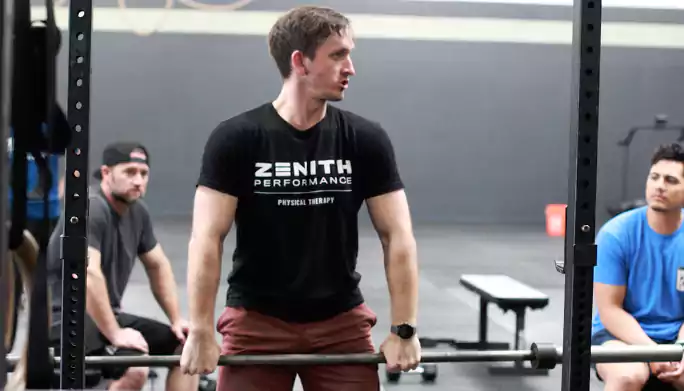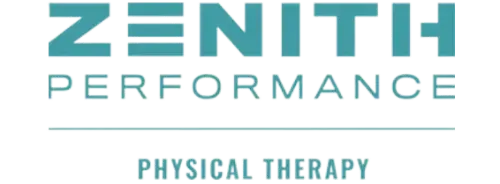Zenith Performance Physical Therapy
Weightlifting Injuries in Long Beach

Conquering Weightlifting Injuries: in Long Beach
If you’re an athlete or fitness enthusiast who loves pumping iron, an injury can bring your training to a sudden halt. Those nagging shoulder, knee, or back issues from improper lifting mechanics or overdoing it could potentially sideline you for weeks or longer.
The good news? With customized physical therapy from our degreed therapists at Zenith Performance Physical Therapy, you can conquer these disruptive weightlifting injuries once and for all. This guide will walk you through:
- The most common weightlifting wounds athletes suffer
- How strength training mishaps can undermine mobility and performance
- What cutting-edge treatment protocols we implement to relieve pain, restore range of motion, and help you lift smarter – not only enabling you to return to the gym or field stronger than ever, but also reducing the likelihood of future flare-ups.
Understanding Weightlifting’s Most Common Culprits
Weightlifting, whether using barbells, dumbbells, kettlebells, or even your body weight, makes you stronger, leaner, and more functionally fit…when executed with proper form and reasonable volume/intensity. However, when progressive overload, poor technique or muscle imbalances are in the equation, it can overstress the musculoskeletal system. Some of the most prevalent lifting-related injuries we treat include:
- Rotator Cuff Issues: The rotator cuff comprises four muscles and tendons stabilizing the shoulder joint. Attempting to lift too much weight with the arms, improper bench press/overhead press form, and even poor posture can strain or tear these tissues. Symptoms range from shoulder impingement and tendinitis to partial/full rotator cuff tears.
- Lower Back Strains: Hyperextending while deadlifting or squatting places enormous pressure on the spine. Twisting under load can also tweak back muscles and ligaments. This leads to anything from mild pain/stiffness to completely debilitating lower back injuries.
- Knee Trouble: The knees handle considerable force during leg presses, squats, lunges, and other poundage-focused lower body exercises — especially when tracking issues like knock knees or bow leggedness are present. Meniscus tears, ACL sprains, patellofemoral (kneecap) pain, and degenerative joint changes can manifest.
- Elbow Issues: Attempting advanced pulling or pressing maneuvers before achieving proper strength adaptation, or simply ramping up intensity too rapidly can inflame tendons around the elbows. Golfer’s elbow and tennis elbow involve pain/damage where these connective tissues attach to the bone.
- Wrist Sprains: Attempting to “muscle up” too much weight places huge tension across the wrists. Combining this with incorrect form or a misaligned grip frequently causes tears, instability, and reduced function — sometimes requiring surgery down the road.
Why Prompt Rehab Is Paramount
If the above symptoms sound familiar, don’t write off that shoulder twinge or knee soreness as “no big deal.” And certainly don’t try to overcome these issues by lifting through pain.
Unresolved, weight training-induced injuries can:
- Worsen with continued training, necessitating longer recovery periods
- Increase susceptibility to even more significant future injuries
- Negatively impact posture and movement efficiency
- Threaten participation in sports, functional fitness, and recreational activities you enjoy
Some data indicates that 1.9-9.29 serious injuries happen per 1,000 weightlifting training hours. Continually training through pain just heightens the chance you’ll ultimately face a major setback requiring surgery, injections or rigid activity modification mandates from your doctor.
The Sooner You Begin Care, the Sooner You Can Get Back After It!
This is where Zenith Performance Physical Therapy comes in. The physical therapists and training staff at our Long Beach clinic feature decades of combined experience rehabbing lifting injuries and helping determined athletes return to iron game domination quickly and safely!
Through manual therapy, corrective exercise, pain relief modalities, and lifting mechanics coaching, we’ll have you feeling stronger fast. In fact, our integrated treatment protocols can slash recovery times by 30% or more compared to homecare options. Here are a few of the ways we get our clients back to crushing PRs in short order:
- Hands-on Pain Relief: Via gentle joint mobilizations, soft tissue work, and trigger point therapy, our therapists alleviate muscle tightness and irritation around the injury site. This reduces swelling and discomfort while restoring normal mobility.
- Movement Reeducation: We identify biomechanical problems like muscle imbalances or poor pelvic/scapular stability sabotaging your lifts. Then we prescribe targeted corrective exercises to build a resilient, bulletproof movement foundation.
- Progressive Overload Principles: Therapist-designed strength training commences once initial pain/inflammation is resolved. Using progressive overload templates proven to spur faster increases in muscle size, power, and endurance, we’ll have you smashing lifting milestones in no time!
- Injury Protection Strategies: Before discharge, we provide personalized guidelines for safe exercise progression, ideal joint-friendly lifting angles, workload/volume management, and correct form benchmarks for each maneuver appropriate for your body. This prevents future strain-related flare-ups.
With individualized treatment sequencing catered to your unique injury, training goals, and body mechanics, rapid, sustainable gains come more easily. In fact, our clients typically resume normal exercise just 2-4 weeks after starting therapy.
Physical Therapy Effectiveness For Weight Training Injuries in Long Beach
Still unsure if professional rehab is right for you? Or wondering just how well physical therapy fares compared to other options? Don’t just take our word for it. Hard statistics back up the potency of conservative care for the full spectrum of strength training issues:
83% of patients with shoulder impingement regain full function within 1-2 months of starting rehabilitation.
Up to 91% of those with knee arthrofibrosis (stiff, painful joints) substantially cut pain and disability through PT versus 58% from steroid injections alone.
Core and hip strengthening physical therapy yields comparable improvements in pain and sports capability versus arthroscopic surgery for femoroacetabular impingement (FAI) syndrome.
Clearly, proper physio works wonders! So whether you’re dealing with shoulder instability when benching, chronic lumbar fatigue from incorrect deadlift mechanics, or nagging wrist discomfort sabotaging your pressing game, we’ve got you covered.
Zenith Performance Physical Therapy Physical Therapy: Frequently Asked Questions About Overcoming Lifting Injuries
If you’re still unsure if specialized rehabilitation is your fastest back to the gym, here’s some helpful info:
What are the most common weight training injuries?
Strained rotator cuff muscles and tendons rank as one of the most prevalent shoulder problems resulting from overzealous strength training. Squats and deadlifts also frequently tweak tissues in the lower spine and knee joints when form fails or sensible joint limits become exceeded.
What damage can lifting too much weight cause?
Pushing progress too aggressively by lifting maximal or near-maximal loads without properly conditioning connective tissue ramps up injury likelihood. Attempting to muscle up weights your current fitness level can’t safely handle often sprains ligaments and tendons. Chronic overexertion can even accelerate joint degeneration over time.
How extensive is injury risk with weight training?
When practiced prudently, weight training carries a relatively low injury risk ranging from 1-5% prevalence. However, incorrectly performing exercises or intentionally training through joint discomfort shoots this rate up drastically. Some data indicates up to 35% of fitness buffs deal with nagging pain linked to exercise over a 12-month span!
Can I resolve training overuse issues on my own?
You can certainly rest from aggravating exercises and apply RICE therapy (rest, ice, compression, and elevation) at home to symptoms in the initial injury stage. However, resuming activity without addressing the root cause frequently prolongs recovery or provokes repeat damage. Hands-on therapy and corrective exercise from a credentialed physio often provides the fastest, most complete comeback.
How Our Westlake Physical Therapy Team Facilitates Quick Rehabilitation
Wondering what separates us from retail chain clinics or neighborhood chiropractors? For starters, our staff hold doctorate-level board certifications in orthopedic and sports physical therapy specialties. We pair this advanced education with decades of combined experience serving high school, collegiate, professional, and everyday athletes.
Meet our experts:
Dr. Hayden Almeida, PT, DPT, leads our physical therapy team. He employs a compassionate, patient-first approach combined with the latest evidence-backed rehab methods to achieve the fastest possible injury recoveries. His areas of expertise include returning post-surgical patients to high function, repairing sports injuries, and developing personalized conditioning programs for teens to older adults.
The Next Steps Toward Conquering Your Lifting Injury
If you’re ready to ditch discomfort and get back to training full-steam ahead, we make it simple to get started. Give our friendly staff a call at 562-502-1767 and we’ll schedule a thorough evaluation to pinpoint the factors underlying your weight room woes. Or check out our website here to learn more about our rehab philosophy.
We can’t wait to help you resolve those nagging shoulder, back or knee issues for good, restore your peak potential, and get you feeling and moving better than ever! Your PRs (and body) will thank you!
About The Author
Dr. Hayden Almeida is a licensed Physical Therapist specializing in physical therapy. With years of experience in the field, Dr. Hayden Almeida has dedicated their career to helping patients achieve their maximum physical potential and improve their quality of life. Currently practicing at Zenith Performance Physical Therapy in Long Beach, Dr. Hayden Almeida employs a patient-centered approach, combining cutting-edge techniques and personalized care plans to address a wide range of physical conditions.


